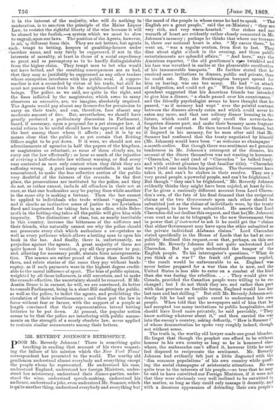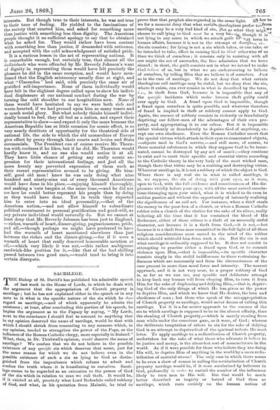MR. REVERDY JOHNSON'S RETROSPECT.
POOR Mr. Reverdy Johnson! There is something quite touching in reading that account of his views respecting the failure of his mission which the New York Times' correspondent has presented to the world. The worthy old gentleman understood almost everybody and everything except the people whom he represented. He understood his case, understood England, understood her foreign Ministers, understood Tier aristocracy, understood their dinner-parties, understood the wine, understood speech-making, understood his audience, understood a joke, even understood Mr. Sumner, which is quite another thing, understood everybody and everything but the mood of the people in whose name he had to speak. "p English are a great people," said the ox-Minister; "they are very rich, and very warm-hearted." Our riches and our warmth of heart are evidently rather closely connected in Ma. Johnson's memory ; perhaps he thinks that where our treasure is, there our national heart is also. My career there," he went on, "was a regular ovation, from first to last. They dine about eight o'clock in the evening, and those public entertainments are splendid affairs." "And here," says the American reporter, " the old gentleman's ejpes twinkled and his face was wreathed in smiles at the pleasurable recollection of his innumerable banquets." He further stated that he received more invitations to dinners, public and private, than he could eat. Nay, the Southampton banquet spread for him on leaving, was one too many. He had "an attack of indigestion, and could not go." When the friendly correspondent suggested that his American friends too intended to give him a dinner, "a shade passed over his countenance," and the friendly psychologist seems to have thought that he paused, "as if memory had wept" over the painful contrast between the dinners already eaten and which could never be eaten any more, and that one solitary dinner looming in the future, which could at best only recall the never-to-beforgotten dinners past, and make their 'Memory more fragrant by the law of contrast. He then turned from the theme, but it lingered in his memory, for he soon after said that Mr. Sumner had confessed that the treaty negotiated by himself (Mr. Johnson) would have been "as welcome DA champagne" a month earlier. But though there was sentiment and genuine tenderness in Mr. Johnson's retrospect of the dinners, his account of the diners themselves was not wanting in keenness. "Clarendon," he said (and of " Clarendon " he talked freely and with evident pleasure by that familiar title), "Clarendon won't yield one inch from his position. The Government have taken it, and can't be shaken in their resolve. They are a very proud people, a powerful people, and can't be frightened." But though "they can't be frightened," Mr. Reverdy Johnson evidently thinks they might have been cajoled, at least by him. For he gives a curiously different account from Lord Clarendon's own, of the fate of his final demand that the reciprocal claims of the two Governments upon each other should be submitted just as the claims of individuals were, by the treaty then signed, to have been submitted. He asserts that Lord Clarendon did not decline this request, and that he(Mr. Johnson) even went so far as to telegraph to the new Government then in power that if instructed to ask it he could get the "claims that either Government may have upon the other submitted as the private individual Alabama claims." Lord Clarendon stated specifically in the House of Lords that he bad at once politely declined this request,—so that, perhaps, on this one point Mr. Reverdy Johnson did not quite understand Lord Clarendon. But he quite understood the temper of the English people. To his interrogator's questions, "What do you think of a war ?" the frank old gentleman replied, "the result would be unfavourable to us. England was never better prepared for a war than she is now, and the United States is less able to enter on a combat of the kind than she was during the rebellion. . . . They would give us Canada, provided the Canadian people were willing to be exchanged ; but I do not think they are, and rather than part with that province on forcible terms, England would lose her last man and last shilling." But still Mr. Reverdy Johnson evidently felt he had not quite cared to understand his own people. When told that the newspapers said of him that he had accepted too many invitations to public hospitalities, and should have lived more privately, he said peevishly, "They know nothing whatever about it," and then carried the war into the enemy's country, asking defiantly, "How is Sumner ?" of whose demonstration he spoke very roughly indeed, though not without sense.
The truth is, the worthy old lawyer made one great blunder. He forgot that though the prophet can afford to be without honour in his own country so long as he is honoured elsewhere, the ambassador can't afford it, however little he may feel disposed to reciprocate the sentiment. Mr. Reverdy Johnson had evidently felt just a little disgusted with the dim common populations' of his own country while quaffing the social champagne of aristocratic attentions. He was quite true to the interests of his people,—so true that he may be said to have outwitted our Foreign Ministers, if it were not that they were obviously very well inclined to be outwitted in the matter, so long as they could only manage it decently, and with a decorous appearance of defending their own people s interests. But though true to their interests, he was not true to their tone of feeling. He yielded to the fascinations of the society that courted him, and asked for something more than justice with something less than dignity. The American people thought it no sufficient apology to say that he obtained what he asked for. They would rather have been content with something less than justice, if demanded with reticence, and accepted with the cold acknowledgment of satisfied pride.
It is a curious lesson in the art of representing nations. It is remarkable enough, but certainly true, that almost all the individuals who were offended by Mr. Reverdy Johnson's want of dignity in representing them would have felt precisely the pleasure he did in the same reception, and would have mentioned that the English aristocracy usually dine at eight, and what " Clarendon " had said, with precisely the same air of gratified self-importance. None of them individually would have felt in the slightest degree called upon to show his individual displeasure at our national conduct during the war by turning the cold shoulder to our hospitalities now. None of them would have hesitated to say we were both rich and warm-hearted, if we had pressed upon him as many toasts and as much social glory. But what nobody thinks himself individually bound to feel, they all feel as a nation, and expect their representative to show—and expect it only the more because the American Republic has so little occasion for scenic effect, is so very nearly destitute of opportunity for the theatrical side of national life, the side to which the old monarchies of Europe give effect by proxy through their courts and levees and State ceremonials. The President can of course receive Mr. Thornton with coolness if he likes, but if he did, Mr. Thornton would hardly know it, and no one else would notice it at all. They have little chance of getting any really scenic expression for their international feelings, and _feel all the more keenly any perverted expression of them such as their recent representative seemed to be giving. He himself, good old man ! knew he was only doing what nine hundred and ninety-nine out of every thousand Americans would have done in his place,—enjoying himself thoroughly, and making a 'cute bargain at the same time,—and he did not see how he could better represent his people than by doing as they would have done. Yet in truth they expected him to enter into an ideal personality,—that of the American nation,—and not allow himself to subordinate political resentment to personal gratification and good-will, as any private individual would naturally do. But we cannot at least deny that Mr. Reverdy Johnson has been just to England, —riches, warmth of heart, dinner-giving, pugnaciousness, pride, and all,—though perhaps we might have preferred to have had the warmth of heart mentioned elsewhere than just between the riches and the dinner-giving,—for if it were a warmth of heart that really deserved honourable mention at all,—which very likely it was not,—this rather ambiguous
sandwich-like position for that of the bad shilling passed between two good ones,—would tend to bring it into certain disrepute.































 Previous page
Previous page